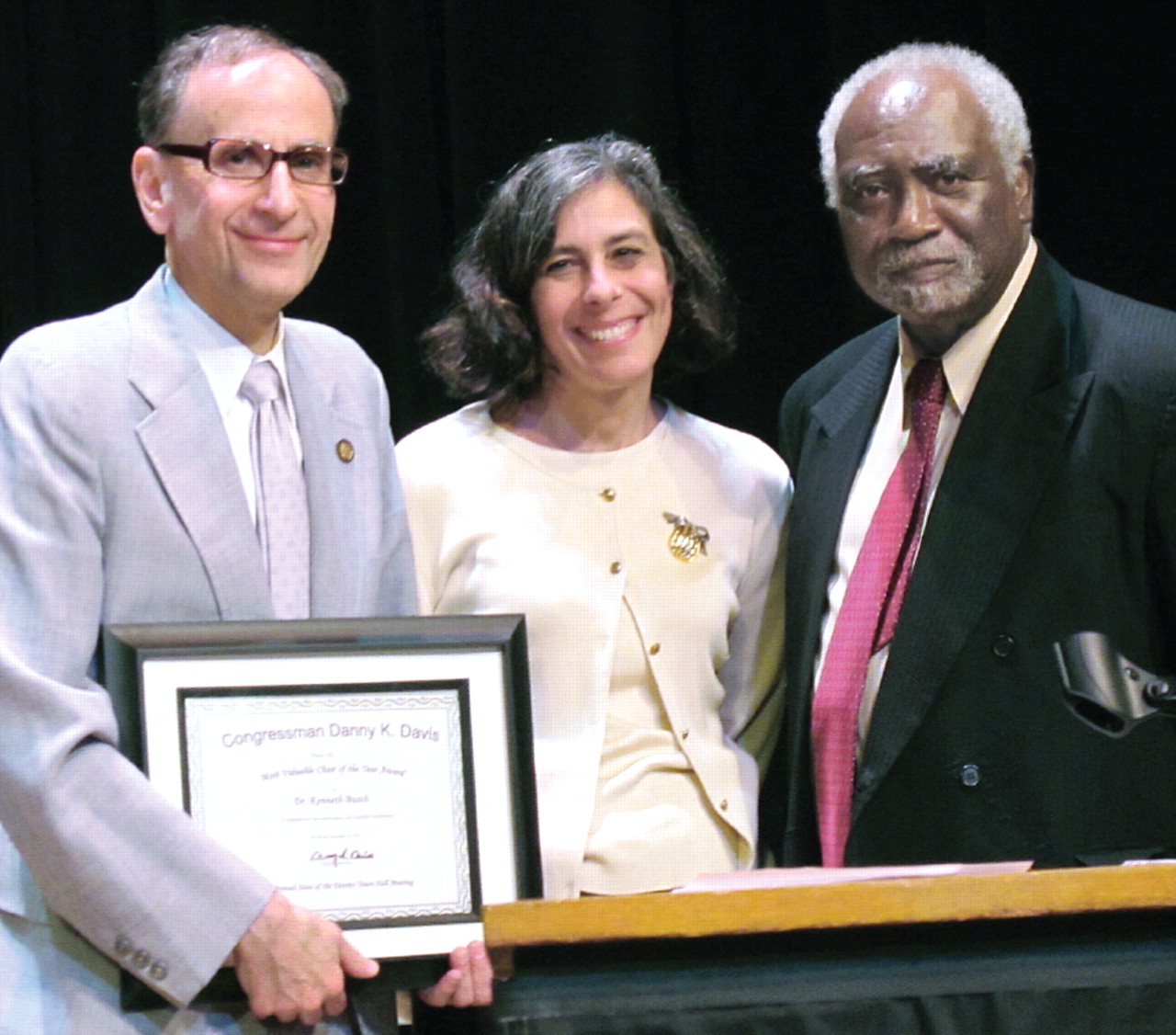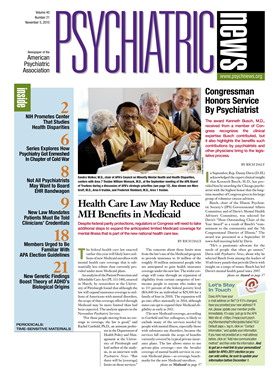In September, Rep. Danny Davis (D-Ill.) acknowledged the expert clinical insight that Kenneth Busch, M.D., has provided him by awarding the Chicago psychiatrist with the highest honor that the longtime member of Congress gives to his large group of volunteer citizen-advisors.
Busch, chair of the Illinois Psychiatric Society's (IPS) Governmental Affairs Committee and of Davis's Mental Health Advisory Committee, was selected for Davis's “Most Outstanding Chair of the Year Award” as a result of Busch's “commitment to the community and the 7th Congressional District of Illinois.” The award was presented at a September 10 town-hall meeting held by Davis.
“He's a passionate advocate for the needs of people that often go unmet,” Davis told Psychiatric News, about why he selected Busch from among the leaders of 30 advisory panels that provide Davis with insight on a range of issues. Busch has led Davis's mental health panel since 2007.
Busch saw the award as a credit to the clinical contributions and long unpaid hours that all members of the mental health advisory panel—which includes other psychiatrists—provided to the congressman during national debates on legislation and policy that impacted mental health care.
“You're driving policy as a member of the [congressional] office on a voluntary level,” said Busch, who spoke with both Davis's local and Washington, D.C., office on policy points, in an interview with Psychiatric News.
Davis, who is a member of the powerful Ways and Means Committee and is now in his seventh term in Congress, has long used constituent advisory panels to collect information on issues that are under discussion in Congress. For instance, the mental health panel has produced two white papers for Davis—on mental health care in prisons and the role of mental health in the general health care system. Additionally, Busch and his advisory panel have rallied physicians from across Davis's district, which has the most medical facilities of any congressional district, to hold summits of health care experts and multiple health-carethemed town-hall meetings with Davis that included clinician panelists.
“Some of these [meetings] would never have occurred if Dr. Busch and his colleagues had not interceded,” said Davis, who is increasing his leadership role on issues involving mental illness.
Busch also has brought Davis into closer contact with clinicians through visits he arranged at some of the district's many medical schools and medical facilities, including a tour of the Rehabilitation Institute of Chicago and Northwestern Memorial Hospital.
Plans to Increase Involvement
The insights that the mental health panel provided to Davis through its reports and the visits to medical facilities reinforced for him the need for such citizen advisory groups, which few members of Congress use.
“I believe very strongly in participatory democracy to get as many people as you can involved in making policy,” Davis said.
Davis, who also has a volunteer advisory panel on general health care issues, said he added a mental health panel because psychiatric illness “doesn't receive nearly the kind of attention it deserves.”
While Davis's doctorate in psychology has made him fluent in mental health issues in general, the added clinical insights of Busch and his mental health panel colleagues have helped Davis drive federal policy changes—through the legislation he authored—related to substance abuse treatment funding, the treatment of inmates with mental illness, and insurance parity between mental health and other types of medical care. Specifically, Busch advised Davis on ways that disparate health insurance policies limit the ability of psychiatrists and other physicians to provide mental health care, including imposing annual caps on the number of outpatient treatment visits for psychiatric care.
“There are all kinds of people who could use a little help and don't get it,” said Davis of his efforts to change federal laws in the areas of addiction treatment, inmate care, and insurance parity.
Similarly, Busch sees significant benefits from donating precious free time to elected leaders. His position on a panel for a member of Congress has allowed him to develop relationships with the leaders of the Illinois State Medical Society; nonphysician health care workers, such as the Illinois Nurses Association; and senior law-enforcement officials. These contacts can become allies in pushing through legislative changes that benefit people with psychiatric illness, Busch said.
But such access alone does not guarantee success. Rather, its Busch's efforts that have helped create the broad-based coalitions that have advanced legislation such as Davis's Second Chance Act (PL 110-199), a 2008 federal law that provides mental health assistance to released prisoners readjusting to society.
“It's a nice example of a district branch working with its elected local federal officials to get good work done at the state and federal levels,” said Carl C. Bell, M.D., president and CEO of the Community Mental Health Council in Chicago and a member of Davis's panel.
Bell credited Davis's in-depth education regarding the pathology of psychiatric illness for his receptiveness to new research data that the member of Congress could use to drive policy changes. For instance, when Bell and others provided him with an Institute of Medicine (IOM) report they wrote on effective mental illness prevention approaches, Davis used that information to push for inclusion of a home-visitation program in the national health care reform legislation to support the mental health of young mothers.
“This is a tremendous actualization of the IOM report,” Bell said about the $1.5 billion program.
How to Get Involved
For Busch, his role in the mental-health-related legislative accomplishments of his member of Congress reinforced the idea that the entire nation can benefit if more clinicians reach out to their elected representatives.
“It's an example of taking it to a higher level than just knocking on the door of a member of Congress and saying ‘This is what I need,’” Busch said.
Meryl Camin Sosa, executive director of IPS and another member of Davis's mental health panel, told Psychiatric News that the IPS has approached other members of Congress about including psychiatrists in similar advisory panels, and at least one representative, Rep. Mike Quigley (D-Ill.), is considering setting up a similar health care committee that would have IPS members.
Busch suggested that other APA members take advantage of the training and access provided by the APA Department of Government Relations—such as its Advocacy Day events on Capitol Hill at which he first met Davis—to establish relationships with their congressional representatives.
Even more effective than in-person meetings with members of Congress are efforts to reach out to their staffs, Busch said. In communicating with congressional staff, psychiatrists should emphasize the insights and advice that they can provide on an issue important to many voters, and once a relationship is established, the aides and their boss will be more receptive to concerns that psychiatrists want to raise.
“They appreciate your input, and we appreciate that they listen to us,” Busch said.

